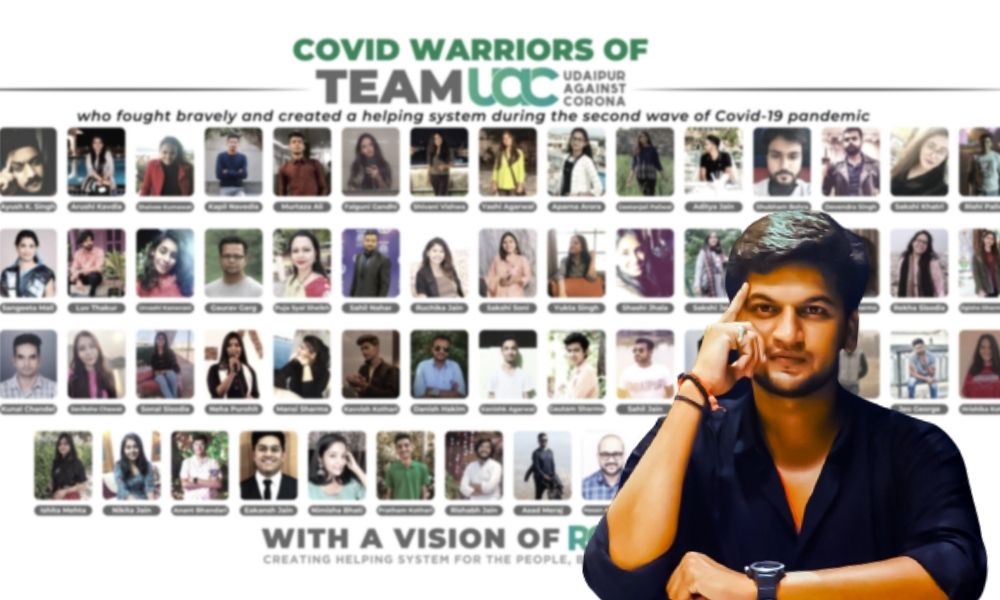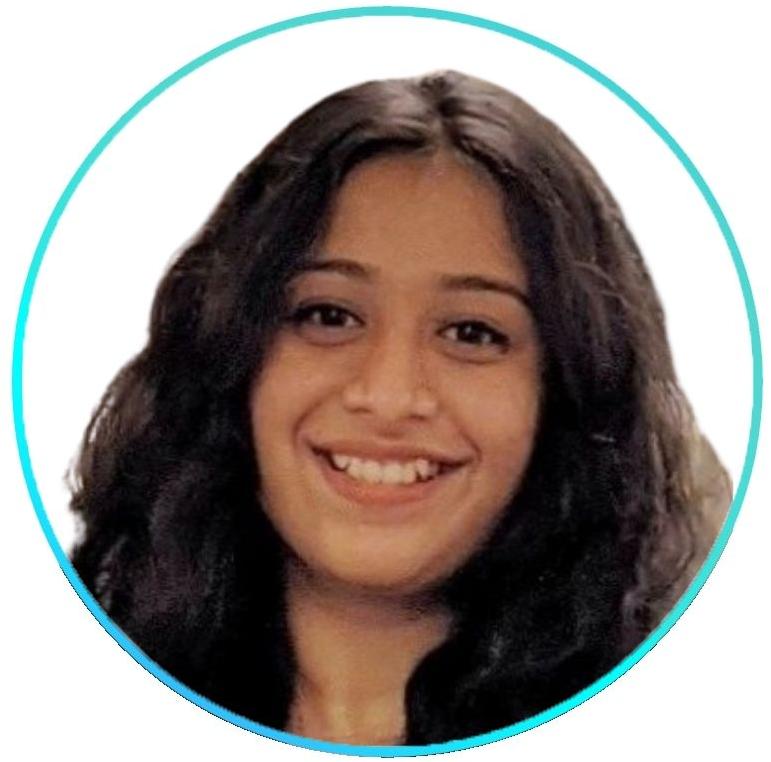
Image: UAC founder Chirag Mehta and his team of 70 core members
Youth In Udaipur Forms Emergency Task Force To Help People In Pandemic
Rajasthan, 24 Jun 2021 12:32 PM GMT | Updated 24 Jun 2021 2:22 PM GMT
Editor : Madhusree Goswami |
A mountain girl trying to make it big in the city. She loves to travel and explore and hence keen on doing on-ground stories. Giving the crux of the matter through her editing skills is her way to pay back the journalism its due credit.
Creatives : Anisha Jain
She is a perseverant individual, committed towards learning and bettering herself. Her sincere goal is to be able to deliver worthwhile contributions by doing needful, constructive, and sensible work. A diligent person at core, She tend to let her inquisition help in this pursuit. Additionally, she can also be found equally invested in my passion for exploration, and travel. Also, she never misses an opportunity to have fun.
The team Udaipur Against Corona inspired other cities to create similar people-led systems to efficiently help with resource sharing in the battle against the pandemic, their helpline received more than 30,000 calls in 30 days.
After a brief lull, when coronavirus cases started rising again around April, it created panic among the masses. The steep rise in cases was accompanied by an acute shortage of medical resources. With no beds and a crippling oxygen shortage, it inflicted unimaginable horror upon the people. Witnessing the critical situation, the youth of Rajasthan's Udaipur rose to the challenge to help the people in the city. The young task force called 'Udaipur Against Corona" (UAC) was a model created to assist the swamped healthcare and administrative system in the city.
The initiative was started by Chirag Mehta, a young engineer and lawyer. Mehta was already in touch with volunteers across the country helping with resource sharing and felt the need to devise a better system to be able to help people faster and more effectively.
"There was resource sharing happening all over the country. People used social media massively for their requirements, and there was information being shared proactively to help share the resources. There was a lot of chaos and panic and amplification of data that the masses would be bombarded with. This made me realise that while we have resources that can be shared, it was being done in a very unorganised manner. There would be information out there, but people in need would find it really difficult to get to it. I realised that there can be a faster and more organised structure that was needed to help the people," Chirag told The Logical Indian.
The young engineer expressed that in his efforts he realised that while there were government helplines, they would always be engaged. Simultaneously, the rising panic in the people remained unsettled as their needs could not be met satisfactorily on time by an already exhausted healthcare system. Observing this, Mehta voiced his concerns to the Chief Medical Health Officer of Udaipur and proposed to help the people by creating a system by the people, for the people.
"We realised that these were times when people were experiencing extreme panic. They had questions that were going unanswered. The helplines were always engaged. This made it clear to me that one number is not enough. We are an overpopulated country, and our healthcare systems have their hands full," said Chirag.
Though the proposal he offered to the CMHO did not receive the intended administrative support, an undeterred Chirag took to social media to call for people who would be willing to form a group to aid the city in a time of emergency. The advocate said that he was already part of various cultural groups in the city and the youth knew him well. This helped him gain an overwhelming number of young persons who actively wanted to be a part of the initiative. What started as a determined will, developed into a team of 70, known as UAC. The large group was divided into several departments specialising in handling one department each.
Segregation Of Departments
Already versed with the nuances of resource sharing and identification of needy patients on social media, Chirag decided to structure the entire model to ensure faster help with minimised queries and problems.
The segregation of departments was done so as to make one sub-team incharge of one issue. The model was devised to be able to easily transact between needs of oxygen, medicine, beds, mental health, food and so on. Each department operated with a different helpline to minimise mixup.
While the system was in place, the next important task for the team was to bring its existence to notice. To make people aware of the helpine, Chirag used his contacts to broadcast the helpline numbers on several large and active groups on social media platforms.
To their surprise, their helpline crashed within some days due to the large number of calls received. This further confirmed that people needed more help than what the government was already providing. Chirag immediately got to work and developed more departments to categorise the needs of the people. UAC now had 14 teams with five members in each team. To ensure methodical and effective assistance to the people, these teams worked intensively on collecting information on resources, verifying each lead, and then filing a proper functional database.
This database consisted of strategically categorised information of all the resources that were already being circulated across the city on social media platforms. While the relevant data was out there making rounds on social media, it was neither verified nor updated. Chirag also mentioned the problem faced with the government helpline as the information on beds available would not be updated regularly. While the governmental system was overwhelmed, he claimed that it was also inconsistent. However, understanding the emergency of the situation, Chirag stated that the solution did not lie in criticising the government as issues are not solved by criticisms.
"We did not want to criticise people, the government was in the same situation as us. There was panic everywhere, and I realised it is better to support the system if we really want it to work. I believe in creating systems rather than criticising people," said the leader.
As the popularity of UAC started to grow, the resource suppliers also started recognising the team and their work. Chirag expressed that the team started to receive support from resource suppliers too. Apart from the helpline numbers, the team also set up a UAC resource page on linktree for people's aid.
Campaigns For Plasma, Medicine, Ration
UAC also managed to successfully operate campaigns for plasma, medicine, and ration donation to the people. "We noticed that there were a lot of demands for plasma, and the needy would be exploded with calls and leads about potential donors. This made us realise a better approach would be to collect the data for people who are willing to donate instead of targeting the patients. This does not only help us in getting the donors faster instead of convincing people to donate but also ensures that people in need get the blood faster. So we curated a list of donors, and instead of going to the needy, we asked them to reach out to us. This ensured a hassle-free transaction for everyone," he pointed out.
"In case of food, we noticed that there were ample people running food services to help the people, so we decided to ensure ration donation especially to the underprivileged. For fieldwork, we united with people already working on the field for supplies to ensure none of our team members gets exposed because that was essential to ensure our work does not stop. Thus we managed to create an extended team just for fieldwork," he added.
The young entrepreneur exclaimed that it was their effective and keen observation of the situation at hand and a strong desire to help people that led them to properly understand the problems and find solutions within the system. "We put out notices asking people to donate medicines. We realised that there were a lot of people who had medicines with them either because they recovered, or the patient passed away, or in cases where they stocked some medicines. We collected the data of people who could donate medicines and injections, and we then connected them to the patients with requirements."
The team realised that the model was working when they started receiving appreciation messages and calls from people.
"The team had been working extremely hard and put their heart and soul into this determination to help people. For 30-35 days we only answered calls and tried to aid as many people as we could. We received more than 30,000 calls in 30 days, our linktree resource page reported more than 14,000 clicks, and it is important to note that Udaipur is a small two-tier city. We were overwhelmed, to say the least, and it was a challenging task to dedicate every single second of our lives to trying to help the people and witness their plight in these dire times. When the appreciation messages starting to pour in, we somewhere realised we are doing good and people are actually being helped. We have received around 200 messages and calls of people telling us that they appreciate our work and that they are thankful," Chirag said.
When the number of cases started to climb down and the callers decreased, Chirag realised that the situation was becoming better. While the pandemic situation started to subside, he also realised that it was not the end. He took this time to spread awareness about his model in other cities too. UAC started to organise webinars inviting volunteers from across the country to explain the model to them.
Their success made them realise that this system can be effectively used in other cities too and Chirag and the team set right to it. Their model then inspired other cities to come up with similar teams and the model was implemented in Gujarat's Modasa, and Rajasthan's Jodhpur and Jaipur. Chirag claimed that they now have a structure in place for a working model of the Rajasthan Against Corona team and are prepared if the third wave of corona strikes.
"Our success made us strengthen our faith in the UAC model and we realised it can be implemented in other cities too. Now that the situation in Udaipur is getting under control, we want to share the knowledge. Our purpose was to empower people to see that they can easily create models and systems that organise resources and ensure effective distribution which was the biggest need of the hour," he added.
Also Read: 'Will Go Anywhere To Administer Jabs', Say COVID Frontliners In Arunachal's Changlang District
 All section
All section














